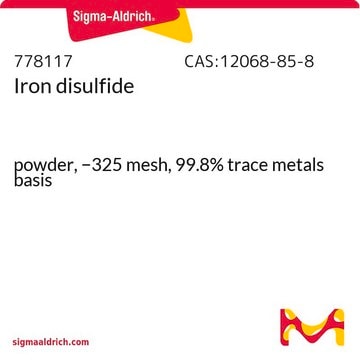12363
Iron(II) sulfide
sticks (thin)
Synonym(s):
Ferrous sulfide
Sign Into View Organizational & Contract Pricing
All Photos(1)
About This Item
Empirical Formula (Hill Notation):
FeS
CAS Number:
Molecular Weight:
87.91
EC Number:
MDL number:
UNSPSC Code:
12352302
eCl@ss:
38190405
PubChem Substance ID:
NACRES:
NA.21
Recommended Products
form
sticks (thin)
Quality Level
concentration
~25% S
density
4.84 g/mL at 25 °C (lit.)
SMILES string
S=[Fe]
InChI
1S/Fe.S
InChI key
MBMLMWLHJBBADN-UHFFFAOYSA-N
Looking for similar products? Visit Product Comparison Guide
Related Categories
Storage Class Code
11 - Combustible Solids
WGK
WGK 3
Flash Point(F)
Not applicable
Flash Point(C)
Not applicable
Personal Protective Equipment
dust mask type N95 (US), Eyeshields, Gloves
Choose from one of the most recent versions:
Already Own This Product?
Find documentation for the products that you have recently purchased in the Document Library.
Effects of solution composition and pH on the reductive dechlorination of hexachloroethane by iron sulfide.
Butler EC and Hayes KF.
Environmental Science & Technology, 32(9), 1276-1284 (1998)
Oxidation of pyrite and iron sulfide by manganese dioxide in marine sediments.
Schippers A and J?rgensen BB.
Geochimica et Cosmochimica Acta, 65(6), 915-922 (2001)
Elisa Guazzelli et al.
Polymers, 12(6) (2020-06-04)
Diblock copolymers composed of a polystyrene first block and a PEG-fluoroalkyl chain-modified polystyrene second block were synthesized by controlled atom transfer radical polymerization (ATRP), starting from the same polystyrene macroinitiator. The wettability of the polymer film surfaces was investigated by
N Finck et al.
Environmental science & technology, 46(18), 10004-10011 (2012-08-21)
The isotope (79)Se may be of great concern with regard to the safe disposal of nuclear wastes in deep geological repositories due to its long half-life and potential mobility in the geosphere. The Se mobility is controlled by the oxidation
Andrew D Henderson et al.
Water research, 47(3), 1267-1276 (2012-12-19)
Iron sulfide (FeS) has been extensively assessed as a reactive medium to remove both metals and halogenated organics from groundwater. However, to address its suitability as a material for permeable reactive barriers (PRBs), its propensity for solids and gas production
Our team of scientists has experience in all areas of research including Life Science, Material Science, Chemical Synthesis, Chromatography, Analytical and many others.
Contact Technical Service







